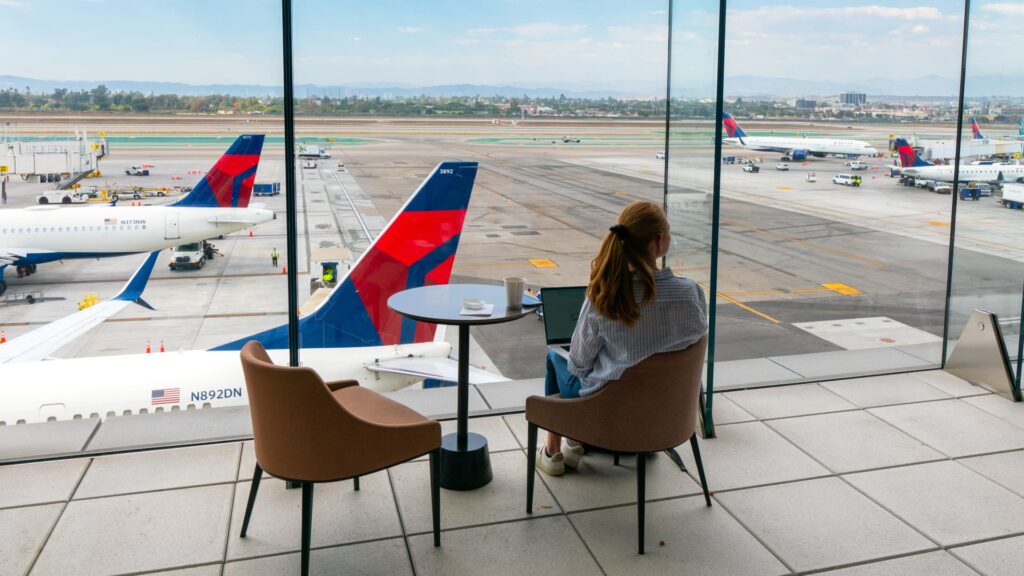
Premium Air Travel Market Thrives Despite Economic Turbulence in 2025
Premium Air Travel Market Thrives Despite Economic Turbulence in 2025
Delta Sky Club at Los Angeles International Airport – Airlines are investing heavily in premium experiences as they target affluent travelers. (Photo: AaronP/Bauer-Griffin/Getty Images)
Table of Contents
- Economic Clouds: Airline CEOs Sound Recession Warnings
- Premium Air Travel Market Resilience Amid Uncertainty
- Luxury Investment: Airlines’ Bet on Premium Experiences
- Capacity Adjustments: Airlines Scale Back on Economy Travel
- International Travel Concerns and Opportunities
- Consumer Sentiment: The Psychology of Premium Spending
- Silver Lining: Potential Deals for Budget Travelers
- Frequently Asked Questions
As economic storm clouds gather on the horizon, the premium air travel market is becoming an increasingly vital lifeline for airlines navigating turbulent financial conditions. Major carriers including Delta and Frontier are pulling their 2025 outlooks amid growing concerns about overall demand, yet they’re simultaneously doubling down on their luxury offerings—an intriguing strategy that reveals much about the current state of airline economics and consumer spending patterns.
Economic Clouds: Airline CEOs Sound Recession Warnings
From their unique vantage point above the clouds, airline executives are spotting economic storm systems forming below. I’ve been tracking industry statements closely, and the shift in tone since January has been remarkable. Delta Air Lines CEO Ed Bastian, who earlier this year confidently predicted 2025 would be the “best financial year” in the carrier’s century-old history, now strikes a dramatically different note.
“I think we’re acting as if we’re going to a recession,” Bastian told CNBC’s “Squawk Box” last Wednesday. “I think everybody is going into a defensive posture.” This stark assessment comes as both Delta and Frontier Airlines withdrew their full-year 2025 financial guidance, citing murky economic conditions and weakening near-term demand.
The concerns extend beyond vague economic anxieties into specific factors affecting air travel demand. Airline CEOs are attributing the slowdown to President Donald Trump’s trade war policies, widespread government layoffs, declining international visitor numbers (particularly from Canada), and most recently, a noticeable drop in domestic coach bookings as price-sensitive consumers grow hesitant about committing to future travel plans.
Economic Warning Signs
- Multiple airlines pulling 2025 financial guidance
- Consumer sentiment tumbling according to University of Michigan survey
- Bank of America reporting decreased spending on discretionary services
- Declining domestic coach bookings, especially mid-week
- Weakening corporate travel demand
- Reduced international visitors, particularly from Canada
Premium Air Travel Market Resilience Amid Uncertainty
While economy cabins show signs of weakening demand, the premium air travel market is demonstrating remarkable resilience. I’ve analyzed travel patterns for years, and this divergence between premium and economy cabins during economic uncertainty isn’t entirely unprecedented, though the current gap is particularly noteworthy.
Delta’s president, Glen Hauenstein, specifically highlighted this trend during the airline’s recent earnings call: “The impact has been most pronounced in domestic and specifically in the main cabin with softness in both consumer and corporate travel. While not immune in this environment, we do continue to see greater resilience in international and our diversified revenue streams, including premium and loyalty, reflecting underlying strength of our core consumer.”
What’s especially interesting is that Delta expects this gap between premium and main cabin performance to widen further. Hauenstein noted that premium revenue continues “to widen the lead over main cabin,” adding, “So we’re expecting the spreads and the yields to actually widen in this next quarter as opposed to converge.” This suggests that even as economic concerns grow, wealthy travelers remain willing to splurge on comfortable travel experiences.
Luxury Investment: Airlines’ Bet on Premium Experiences
Far from pulling back on luxury offerings during this period of economic uncertainty, airlines are actually accelerating their investments in the premium air travel market. I’ve visited several newly renovated airport lounges recently, and the level of opulence is striking—a clear indication that airlines believe in the long-term value of catering to high-spending customers.
Airlines and credit card companies have been aggressively expanding their plush airport lounges, creating increasingly exclusive spaces with enhanced amenities. Simultaneously, carriers are racing to outfit their aircraft with more premium seating options, including the increasingly popular suites with doors that offer unprecedented privacy.
European carriers are making similar moves. Air France and Lufthansa recently unveiled new, spacious first-class cabins that represent significant investments in their premium offerings. The demand for these high-end seats—which contain hundreds of sophisticated components and require regulatory approval—is so strong that it’s actually creating bottlenecks in new aircraft deliveries.
Premium Travel Innovations
- Expansion of airport lounges by airlines and credit card companies
- Installation of more premium seats with features like privacy doors
- New first-class cabin designs from Air France and Lufthansa
- Increased marketing of premium economy as a mid-tier luxury option
- Spirit Airlines promoting its “Big Front Seat” with luxury messaging
- Targeted strategies to attract wealthy leisure travelers
Even budget carriers are getting in on the trend. Spirit Airlines, traditionally known for no-frills service, recently used a quote from the HBO show “The White Lotus” to promote its “Big Front Seat” option: “I just don’t think at this age, I’m meant to live an uncomfortable life.” This premium seat can fetch three times the price of a standard seat in exchange for more legroom and enhanced comfort—a clear attempt to capture some of the higher-yield market that’s proving more resilient during this economic uncertainty.
Capacity Adjustments: Airlines Scale Back on Economy Travel
As airlines reorient toward the premium air travel market, they’re simultaneously scaling back capacity in less profitable segments. I’ve noticed this strategy developing over several quarters, but the recent economic concerns have accelerated these adjustments.
Delta and Frontier have announced plans to reduce their growth trajectories or even cut capacity outright, particularly targeting off-peak domestic routes on traditionally slower days like Tuesdays and Wednesdays. This strategic pullback allows airlines to concentrate their resources on higher-yield routes and times while minimizing exposure to the price-sensitive domestic market that’s showing signs of weakness.
In contrast to these domestic reductions, airlines generally remain optimistic about expensive international routes, especially for premium cabins like long-haul business class and premium economy. United Airlines, which has invested heavily in high-end refurbishments and launched flashy new international destinations aimed at wealthy travelers, appears particularly well-positioned to capitalize on this segment’s continued strength.
International Travel Concerns and Opportunities
Despite the relative resilience of international premium travel, there are concerning trends emerging in global air travel patterns that could affect the broader premium air travel market. After spending considerable time analyzing international travel data, I’ve identified some worrying signals.
Both Delta and United have begun reducing some of their Canada-U.S. flights, responding to declining demand for U.S.-bound travel from Canadian customers. This trend threatens to further widen the already substantial $50 billion U.S. international travel deficit.
The U.S. Commerce Department’s data paints a concerning picture: non-U.S. citizen visitor arrivals last month totaled approximately 4.5 million—down nearly 13% from 2019 pre-pandemic levels and almost 10% lower than the same month last year. This decline in international visitors represents a significant headwind for the industry.
However, this softening demand could create opportunities for travelers looking to visit Europe this summer. With airlines maintaining significant international capacity despite weakening demand, fare sales are becoming more common even during traditionally peak travel periods.
Consumer Sentiment: The Psychology of Premium Spending
The divergence between economy and premium air travel market performance reveals fascinating insights about consumer psychology during economic uncertainty. I’ve observed this pattern across multiple economic cycles: as broader economic concerns rise, many affluent consumers actually intensify their focus on quality experiences rather than cutting back across the board.
Consumer sentiment measured by the University of Michigan survey tumbled this month, and Bank of America reported in a Thursday analysis that consumer spending on “nice to have” discretionary services like restaurants and tourism slipped in February and March. Yet within this overall decline, premium travel categories are showing remarkable resilience.
This seemingly contradictory behavior stems from a psychological phenomenon where wealthy consumers become more selective rather than simply reducing spending. They may forego multiple smaller purchases but maintain or even increase spending on high-value experiences that deliver meaningful comfort and status benefits—precisely what premium air travel offers.
Premium Travel Consumer Insights
The resilience of premium air travel during economic uncertainty reveals a key insight for travelers and investors alike: While overall travel volume may decrease, the premium segment often maintains stronger pricing power. This creates both opportunities and challenges—premium travelers may find better availability and service as airlines compete intensely for their business, while economy travelers might face higher base fares as airlines optimize revenue management.
Silver Lining: Potential Deals for Budget Travelers
While airlines focus increasingly on the premium air travel market, there’s a potential silver lining for budget-conscious travelers. The industry’s capacity adjustments and shifting focus could create pockets of exceptional value, particularly for flexible travelers willing to book during off-peak periods or explore international destinations.
According to Scott Keyes, founder of travel deal site Going (formerly Scott’s Cheap Flights), “This is probably the best summer for Europe travel I’ve seen in years. I don’t think there would have been all that much hope for it in 2022, 2023 and 2024. The stars are aligning to boost the odds.”
Airlines have already been running fare sales extending through late spring, and these promotional offers could extend to popular international destinations as carriers work to fill seats during a period of softening demand. For savvy travelers willing to book strategically, the current market conditions might create some of the best international travel opportunities in years.
Frequently Asked Questions
How is the premium air travel market performing compared to economy?
The premium air travel market is showing significantly more resilience than economy travel in 2025. While domestic economy bookings are weakening, premium cabins continue to perform well, with Delta reporting that premium revenue is widening its lead over main cabin revenue. Airlines expect this gap to expand further in the coming quarters as affluent travelers continue to prioritize comfort even amid economic uncertainty.
Why are airlines investing in premium services despite economic concerns?
Airlines are investing in premium services because wealthy travelers have proven less sensitive to economic downturns. High-end customers provide significantly better profit margins and more stable demand during uncertain times. By expanding airport lounges, adding luxury seating options, and enhancing premium experiences, airlines are strategically positioning themselves to capture the most profitable market segment while reducing exposure to price-sensitive travelers.
What economic factors are affecting airline bookings in 2025?
Multiple economic factors are impacting airline bookings in 2025, including President Trump’s trade war policies, government layoffs, declining international visitors (particularly from Canada), decreased corporate travel, and growing consumer hesitance about discretionary spending. These factors have led major carriers like Delta and Frontier to withdraw their financial guidance for the year as they adjust to changing market conditions.
Will there be good deals for international travel this summer?
Yes, industry experts suggest this could be an excellent summer for international travel deals, particularly to Europe. With softening demand but maintained capacity, airlines are likely to offer more promotional fares even during traditionally peak travel periods. According to travel deal expert Scott Keyes, “This is probably the best summer for Europe travel I’ve seen in years,” as airlines work to fill seats during a period of economic uncertainty.
How are airlines adjusting their flight capacities in response to current trends?
Airlines are strategically adjusting capacity by reducing domestic flights, particularly on off-peak days like Tuesdays and Wednesdays, while generally maintaining their international and premium routes. Delta and Frontier have announced scaled-back growth plans or outright capacity reductions in less profitable segments, allowing them to concentrate resources on higher-yield international routes and premium cabins where demand remains stronger.






